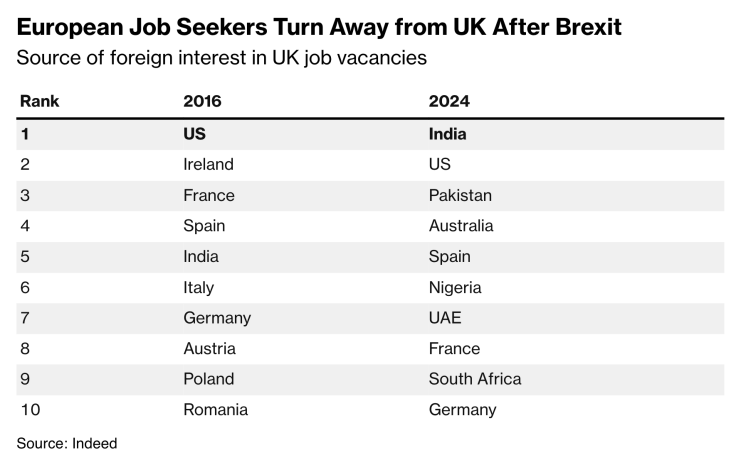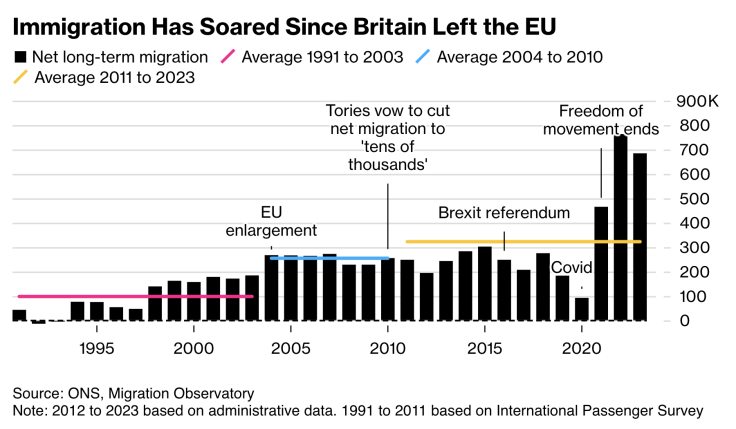
Despite being geographically proximate to the United Kingdom, the number of Irish citizens pursuing employment opportunities in the UK is diminishing. According to recent data from the recruitment platform Indeed, this trend is attributed to the rising anti-immigration sentiment among now former UK government officials.
Indeed's data reveals a significant shift: Ireland has fallen out of the top ten nationalities seeking work in the UK, contrasting to its second-place ranking in 2016. This decline is primarily attributed to Brexit, which has considerably affected the UK's attractiveness to workers from the European Union.
Changing Dynamics of Job Seeker Demographics
The latest data from Indeed highlights a notable shift in the demographics of job seekers coming to the UK. The top five countries whose citizens are now seeking employment in the UK are India, the United States, Pakistan, Australia, and Spain. Italy, Austria, Poland, and Romania have also dropped out of the top ten. Conversely, Nigeria, the UAE, and South Africa have newly entered the top ten.
In 2016, job seekers from Europe predominantly sought employment in the UK. However, post-Brexit, there has been a noticeable shift towards more distant regions, facilitated by loosened entry restrictions for non-European countries. As a result, the influx of job seekers from Asia and Africa has surpassed those from Poland, Italy, and Ireland.

Jack Kennedy, an economist at Indeed Hiring Lab, noted that job seekers, particularly in the healthcare sector, increasingly originate from the Anglosphere, former Commonwealth nations, and African countries. "We are observing a significant increase in job seekers from these countries at the expense of European nations," he remarked.
Impact of Brexit on the Irish Workforce
Despite a longstanding mobility agreement that allows Irish citizens to work and reside in the UK, changes to immigration laws have primarily impacted those from other nations. These restrictions have complicated hiring affordable labour from the EU for UK businesses while slightly broadening entry opportunities for individuals from non-EU countries.
The repercussions of Brexit have strained the relationship between Ireland and the UK. Local Irish politicians have pointed to the UK's stringent migration policies as a significant source of tension between the two governments. Former Taoiseach Bertie Ahern articulated this sentiment: "The only way to return to pre-Brexit conditions is to leverage existing structures; we will overcome these challenges."
Nigel Farage, leader of the Reform UK party, has capitalised on the public's dissatisfaction with immigration, gaining traction in polls by advocating for stricter immigration laws. This political manoeuvring has placed Conservative Prime Minister Rishi Sunak on the defensive, as the government has overseen rising immigration levels during its 14-year tenure.

Growth of Domestic Employment in Ireland
While the number of Irish citizens seeking employment in the UK has declined, domestic job opportunities in Ireland are rising. A recent LinkedIn study revealed that over 15% of job postings in Ireland offer remote or hybrid work options, positioning the country ahead of the US, Germany, and France but behind the UK, Austria, Spain, and Poland.
Moreover, the influx of multinational corporations has significantly bolstered local employment in Ireland. For instance, IBM has announced plans to create an additional 800 jobs across Ireland over the next three years. James Kavanaugh, IBM's senior vice president and chief financial officer, emphasised, "As IBM continues to assist organisations in transforming their businesses with hybrid cloud and AI, attracting, developing, and retaining talent remains a key priority."
While Brexit and evolving immigration policies have decreased the number of Irish job seekers in the UK, employment opportunities within Ireland are expanding, driven by a robust local job market and the presence of multinational corporations. This shift underscores the broader implications of Brexit on labour mobility and economic relations within Europe, highlighting the need for strategic adjustments in the UK and Ireland to navigate this evolving landscape.







